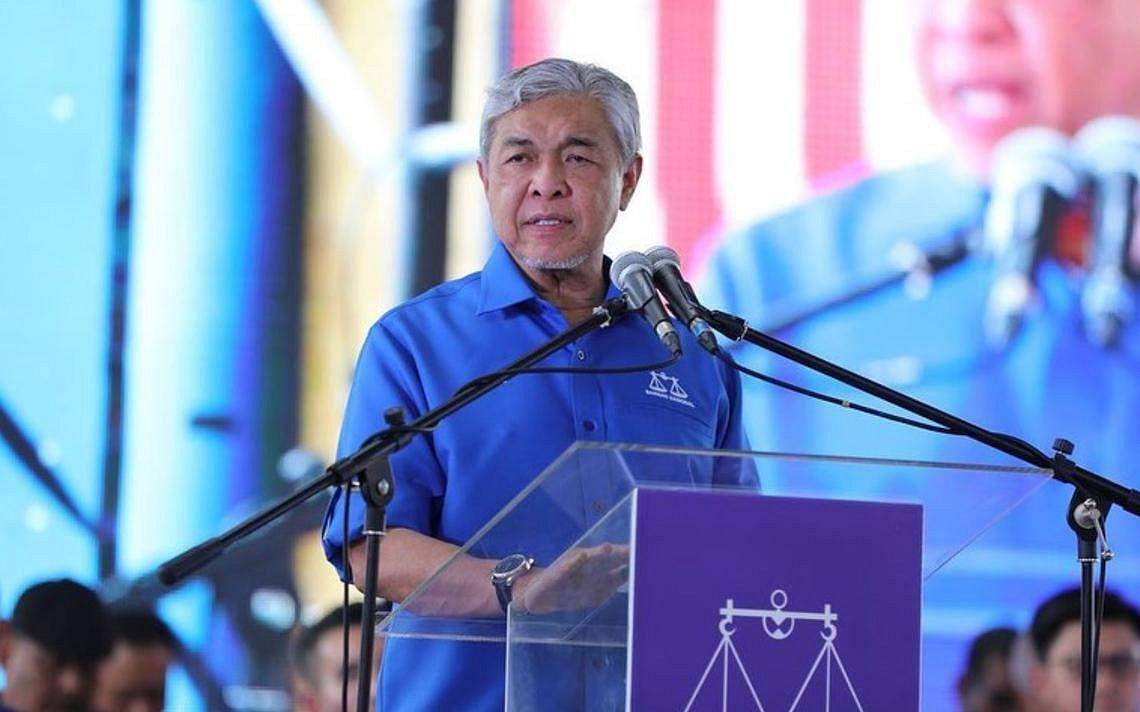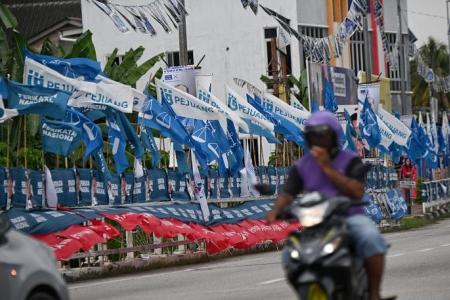Seven things to know about Malaysia’s GE results
KUALA LUMPUR - Rival parties are rushing to cobble together an alliance to govern Malaysia following the Nov 19 general election.
Here are seven things to know in the aftermath of the national polls.
A hung Parliament
Malaysia is now in unchartered waters with a hung Parliament for the first time in its history, which has triggered intense horse-trading among the main contenders.
Pakatan Harapan (PH) chief Anwar Ibrahim and his Barisan Nasional (BN) counterpart Zahid Hamidi met on Monday morning, just hours before a palace deadline for Malaysia’s political leaders to form a government.
On Sunday, Gabungan Parti Sarawak (GPS) said it will support a coalition comprising itself, BN, Perikatan Nasional (PN) and Gabungan Rakyat Sabah (GRS) to form the next Malaysian government.
The states of Perak and Pahang - which held state polls concurrently with the federal elections - were also left with hung assemblies.
The current uncertainty, if prolonged, could hamper efforts to revive an economy that’s on a fragile rebound amid rising living costs.
As it is, the ringgit fell almost 0.8 per cent against the greenback, its steepest drop in seven months, as investors reacted to the prospect of prolonged instability and political compromise.
Against the Singapore dollar, the ringgit weakened 0.45 per cent to 3.332, making for a year-to-date drop of 7.3 per cent.
Kuala Lumpur stocks’ benchmark index fell more than 1 per cent to its lowest level since Nov 4, hitting a trough of 1,427.75.
Role of the King
Malaysia’s King is once again expected to play a major role in determining who forms the government.
The palace has decreed that all political parties must submit the names of their respective prime minister candidates by 2pm on Monday, as well as declare their respective alliances to form a government. The deadline was later extended by another 24 hours.
This is similar to the procedure implemented by the palace when the last two governments were formed.
In March 2020, Sultan Abdullah Ahmad Shah named Tan Sri Muhyiddin Yassin as prime minister without a parliamentary vote after the PH government collapsed due to MP defections.
Sultan Abdullah stepped in again to appoint Umno’s Ismail Sabri Yaakob as prime minister 15 months later when Umno lawmakers withdrew their support from Mr Muhyiddin, forcing him to resign.
Umno takes a beating
The Umno-led BN clinched just 30 seats, its worst showing ever, with several of its lawmakers losing stronghold seats as the Malay party’s infighting and graft-tainted reputation turned voters away.
The results of Saturday’s vote have left Umno’s top leadership, especially president Zahid Hamidi, licking their wounds having agitated caretaker Prime Minister Ismail Sabri Yaakob to dissolve Parliament early.
With the dust yet to settle, the knives are already out for Zahid, with calls from Umno members for him to step down as party president, and also as chair of BN.
Zahid, however, appears to have no intention of relinquishing control of the party. In a statement on Sunday, he reiterated that all elected BN MPs had signed statutory declarations giving him the mandate to negotiate with any party about forming a government post-election.

End of the road for old guards
Several political heavyweights lost their seats, and for some, even their deposits.
The biggest name to fall was two-time premier Mahathir Mohamad, 97, who lost his seat in Parliament after residents of Langkawi voted to put PN in control of the island constituency.
Tun Dr Mahathir managed to garner only 4,566 votes, or 6.8 per cent of the votes– less than the 12.5 per cent vote threshold required to keep his deposit as a candidate.
His son Mukhriz, who was defending his Jerlun seat in Kedah, also lost his deposit to PN’s Abdul Ghani Ahmad.
Over in Selangor, caretaker International Trade Minister Azmin Ali was trounced by his protege-turned-rival, Selangor Menteri Besar Amirudin Shari in the Gombak parliamentary seat, ending Mr Azmin’s three-term grip of the opposition stronghold.
In nearby Putrajaya, Umno stalwart Tengku Adnan Tengku Mansor failed to retain the ward he has held since the federal administrative capital’s inception in 2004, losing to PN.
Malaysia’s longest-serving MP Tengku Razaleigh Hamzah lost his Gua Musang seat in Kelantan to PN. The BN stalwart – who has held the seat for 12 terms since 1974 – polled 21,663 votes, which is just 163 votes fewer than the winning candidate Mohd Azizi, who claimed 21,826 votes.
Upsetting losses
Caretaker Health Minister Khairy Jamaluddin and caretaker Finance Minister Tengku Zafrul Aziz bettered BN’s performance in 2018, but lost in Sungai Buloh and Kuala Selangor, respectively, as their coalition failed to score a single win in Malaysia’s richest state of Selangor.
Mr Khairy said it was not the end of the road for him, but wanted time to reflect on the outcome of the national polls before deciding on what to do next.
Another shocking loss came from Ms Nurul Izzah Anwar, daughter of opposition leader Anwar. She was defeated in the family seat of Permatang Pauh in Penang, once considered a bastion for their Parti Keadilan Rakyat, which leads PH.
Biggest gainer: Perikatan Nasional
PN, led by former prime minister Muhyiddin - who now has a fighting chance to be Malaysia’s 10th PM - has become a formidable alternative to Umno after defying analysts predictions by making the biggest gains this election.
Its promise of a clean government that will protect Malay-Muslim unity and Bumiputera-affirmative action policies found favour with voters, resulting in PN gaining 73 seats.
Aware that its partner, the right-wing PAS, may alienate the more liberal urban electorate, PN flew its flags in the developed Klang Valley areas of Kuala Lumpur and Selangor, while opting to use the iconic green PAS banners in the conservative east coast states of Pahang, Kelantan and Terengganu. This tactic, say political analysts, served the coalition well at the polls.
The rise of PAS
Parti Islam Se-Malaysia (PAS) emerged as the single party with the most seats – 44, exceeding Mr Muhyiddin’s own Parti Pribumi Bersatu Malaysia (Bersatu) in PN.
In the previous election in 2018, it won only 18 seats.
Chinese dominated rival, Democratic Action Party (DAP), a key member of PH, came in second with 40 seats, almost maintaining its 2018 margin of 42 seats.
PAS’ victory in the mostly rural regions of Peninsular Malaysia puts it in a strong position to play a larger role in the federal legislature.
Analysts say should PN come into federal power, PAS, which has long espoused Islamist views that critics say infringe on personal freedoms, would have a more significant role in government that would shore up its influence for the next five years, when the next election is due.
Get The New Paper on your phone with the free TNP app. Download from the Apple App Store or Google Play Store now


